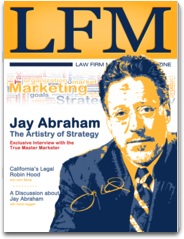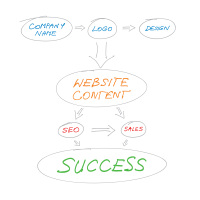Attorney Matthew Dubin of the Law Offices of Matthew D. Dubin, in Seattle, Washington shares with Author and Educator Michael J. Swanson some great ideas to help grow your law practice.
How to be a Leader in Your Law Firm
Watch Michael J. Swanson's recent interview with Attorney Rocky McElhaney of The Rocky McElhaney Law Firm in Nashville, TN where they discuss how to make the leap from manger to leader in your law firm.
Social Media Marketing for Law Firms
Attorney Matthew Dubin of the Law Offices of Matthew D. Dubin, in Seattle, Washington shares with Author and Educator Michael J. Swanson a few tips for lawyers to better market their firm on Facebook.
Social Media Manners for Law Firms

In today’s marketing world, it has become obvious how important social media is. However, just like every other social form of communication, there are manners that not only help one maintain a level of respect, but also help set one apart from the rest. I know this from my own professional experience, which is why I felt compelled to share an article by Samantha Collier, writer of the award winning “Social Media for Law Firms” blog.
Samantha covers several “do’s” and “don’ts” in social media, all of which are specifically aimed in helping attorneys and others in the legal profession. To read her full article, click here. Here are just a few she mentioned.
- “Remember reciprocity when utilizing social media for business development.”
- “Respond to criticism and conflicting opinions.”
- “Remember your reputation and brand on social media.”
- “Do not over-promote yourself when using social media.”
- “Don’t boast about your praise online.”
I highly recommend this to any attorney who is utilizing social media to market their firm. Marketing a law firm today is already challenging enough, but the proper use of social media can help leverage your efforts.
New App for Law Firms: If This Then That (IFTTT)

By Tina Burns
Smartphones have revolutionized the business world and the ability to work on the go. From social media to content storage, it can feel overwhelming when trying to remember to backup files, add events to your calendar or even check the weather…until now.
In a recent article from Attorney Christopher B. Hopkins of Akerman, LLP, we discover the new app IFTTT (If This Then That) that “allows you to get value from your mobile device and social media without “checking in” constantly — thus reducing your internet-induced stress.” This user-friendly app requires no coding or advanced technical knowledge. You simply create ‘Recipes’ to tell the app what to do after a certain action occurs. Here are some example recipes that Mr. Hopkins mentioned:
- Facebook & Twitter: Eliminate opening both account and set IFTTT so that anything you write on Twitter with the tag “#FB” will be posted on Facebook (or vice versa).
- Save Email Attachments to Google Drive: Set IFTTT to download all email attachments to a folder in Google Drive — or set the trigger so that IFTTT will save PDF attachments in a folder if you put “#receipts” in title of an email you send to yourself.
- Weather: If it is going to rain tomorrow in [location], it will send you a text or have IFTTT send you the weather report each morning.
- Congress or Presidential Updates: Set IFTTT to email you when the President signs a new law or Congress schedules a vote on a bill.
(Read the full article “If This Then That (IFTTT) For Lawyers”)
This is just one of the many free productivity apps available for professions to help organize your life and your business.
A Key Factor in Growing and Managing Your Law Firm
Attorney Christian Scranton of Scranton Law Firm in Concord, California shares with Author and Educator Michael J. Swanson how being responsive is the "secret sauce" to grow your law firm.
How To Go Paperless At Your Law Firm
Attorneys Bob and Brad Simon of The Simon Law Group in Hermosa Beach, California, share with Author and Educator Michael J. Swanson what to do to go paperless at your law firm and how it can help you get better results for your clients.
Why is a Succession Plan Important for Your Law Firm?
Joseph E. Fournier, attorney and CPA of Fournier Legal Services, joins Michael J. Swanson to discuss why it is important for law firms to have a succession plan.
New Law Practice Management Resource Coming Soon
Attorney Sean Claggett of Sean K. Claggett & Associates, LLC, in Las Vegas, Nevada shares with Author and Educator Michael J. Swanson his law practice management book that he will be publishing soon.
Three Marketing Tips to Grow Your Law Practice
Attorney John Fisher in Kingston, New York shares with Author and Educator Michael J. Swanson marketing tips that he uses to contribute to the growth of his law firm.
For a free copy of "The Power of a System," email Mr. Fisher at JFisher@fishermalpracticelaw.com.
How To Go Paperless At Your Law Firm
John K. Zaid of John K. Zaid & Associates has used a paperless system since the start of his law firm over 17 years ago. In today's video, Micheal J. Swanson interviews Attorney Zaid about his experience with going paperless. Check it out for some helpful tips.
How To Use Networking To Grow Your Law Practice
In today's video, Attorney John K. Zaid of John K. Zaid & Associates shares with Author and Educator, Michael J. Swanson how he used networking to grow his law firm from a solo practice to a firm with over 50 employees.
Unique Way to Use Video in Law Firm Marketing
In part two of author and educator Mr. Swanson’s interview with America’s Top Trial Attorney, William Ricigliano of Ricigliano & Filopei, and his business partner, Michael Sorrentino of Nationwide Legal Video Services, they discuss different unique ways to use video marketing at your law firm.
Law Firm Marketing Magazine – Now Free!

Some of you may have heard about the new publication available for the iPad called Law Firm Marketing. If you have not, I suggest you check it out. It was launched in October of 2012. It is the legal industry’s first interactive, digital magazine and it’s now available for free! It is designed to help you learn the best marketing practices from other successful lawyers as well as some of today’s top legal marketing experts. You can get the latest issue free by subscribing on iTunes or downloading the app by clicking here. Since the magazine is digital, it makes use of video interviews, hyperlinks and other interactive content. You can download the magazine in several different languages as well.
If you do not have an iPad, don’t worry! You can view the recent video interviews feature in the magazine on The Law Firm Marketing Magazine YouTube channel.
In the very first issue, the magazine featured Gerry Spence. Spence is widely known as one of the best trial lawyers of all time, which is why he was an easy pick to be featured in the first edition of the magazine. Spence founded the Trial Lawyers College in 1994 and has an amazing record of accomplishments with zero criminal cases lost. Also featured so far in the magazine is current American Association for Justice President, Mary Alice McLarty and well-known marketing guru, Jay Abraham.
Cindy Speaker is the CEO of Speaker Media and Marketing and the developer behind the Law Firm Marketing Magazine. She is known as “The secret weapon of personal injury lawyers and trial attorneys throughout the U.S.” It is no wonder attorneys across the country run to Cindy for marketing advice, she has an extensive list of successful clients as well as a published documentary, “Well of Dreams”. She believes this magazine will help law firms stay on top of an ever-changing marketing landscape.
If you are a trial lawyer (or are involved in law firm marketing) you should download your own copy of Law Firm Marketing right now!
Tina Burns
Vice President
The Future in Law Practice Information Management: OnPoint.Legal

Lawyers are busy. Lawyers track lots of documents and information. Lawyers need immediate access to their case information, but it has to be secure - protected. Lawyers want simple. And contrary to popular beliefs, lawyers DO have budgets.
At Symbioshare, we get that. Why? Because we ARE lawyers. But before we were lawyers, we were engineers. As lawyers, we got tired of case management resources that touted solutions, but failed to deliver. Symbioshare’s flagship product, OnPoint.Legal, is the proven result of over 4 ½ years of development and testing. As engineers, we will tell you there is nothing else like this on the market today. As lawyers, we will tell you there really is a case management solution for all those “I wish I could...” moments you’ve had sitting at your computer.
 OnPoint.Legal is a matter management software application designed to give attorneys complete flexibility and control in their practice’s case structure, organization and operations. OnPoint.Legal enables you to practice law in the way most beneficial to you.
OnPoint.Legal is a matter management software application designed to give attorneys complete flexibility and control in their practice’s case structure, organization and operations. OnPoint.Legal enables you to practice law in the way most beneficial to you.
 OnPoint.Legal integrates with Microsoft SharePoint Online allowing increased security, flexibility, reliability, enhanced collaboration and an experience unmatched by any other system on the market. Imagine, a software application that organizes, controls and displays key information in one simple view utilizing tools that you use every day, e.g., Microsoft Outlook, Word, Excel, and Internet Explorer.
OnPoint.Legal integrates with Microsoft SharePoint Online allowing increased security, flexibility, reliability, enhanced collaboration and an experience unmatched by any other system on the market. Imagine, a software application that organizes, controls and displays key information in one simple view utilizing tools that you use every day, e.g., Microsoft Outlook, Word, Excel, and Internet Explorer.
At Symbioshare, we are driven to help your practice succeed in a seamless transition to the next generation information management system. OnPoint.Legal’s integration capabilities enable lawyers to keep the information most important to your practice immediately accessible regardless of your geographic location. OnPoint.Legal utilizes the strongest features of each Microsoft Office 365 application to efficiently and effectively empower law firms to manage their practice in a matter and client centric design to collaborate on projects, track deadlines, delegate or assign tasking, and route documents for review, editing, and approval. What sets us apart is that we can help you do all of this without changing the way you want to practice law and save you money along the way. Call and let us help you today!
t: 478.254.9651
What Can Excel Do For Your Law Firm?

Well, as it turns out, there is a lot Microsoft Excel can do when it comes to helping you manage your firm. Sure, it’s great for keeping track of numbers, simplifying the use of formulas, etc. Fun stuff, we know.
However, there are more ways you can use Excel. Jeff Bennion, contributor to AboveTheLaw.com, recently covered some the basic ways it can be used.
- Calendaring Court Dates
- Analyzing Voluminous Privilege Logs
- Deeper Analysis With Pivot Tables
Mr. Bennion gives a detailed guide on setting up Excel so that can be used for the three uses listed above. Once you’ve set up a spreadsheet for the three uses (or one, depending on your current needs) managing the aspects of your firm will become less time consuming. And hopefully paperless!
Click the link below to view the full article.
Why Excel Is The Most Underappreciated Program In Your Law Office
Photo Credit: harunatsukobo
Is Your Law Firm Utilizing Inbound Marketing?

The phrase 'inbound marketing' is becoming increasingly popular, and chances are that you have heard the term before especially when marketing professionals discuss it as a means to help supplement lead generation. However, why is inbound marketing so important, and how can it help your law firm generate real leads and cultivate real relationships?
What Is Inbound Marketing?
An inbound marketing strategy focuses on attracting prospects through a variety of marketing channels, like your website, SEO, blog articles, and email discussions, and then systematically provides relevant and helpful follow-up information to build credibility, rapport, and conversions.
With traditional marketing (outbound marketing), businesses focus on finding clients, often using unwelcome marketing techniques like cold calls and junk email/print mail. Instead of interrupting people with these invasive tactics, inbound marketing positions your law firm to be the solution to the answer that your ideal clients are seeking by speaking to their specific needs.
The heart of inbound marketing focuses on building awareness and creating valuable, educational content that pulls people toward your website where they can learn more about the solutions to their problem on their own time. Providing valuable content gives your prospective clients the guidance they need to develop trust and recognition in your firm, and ultimately helps convert them from a prospect to a paying client. Nowhere is trust more important than in the relationship that exists between an attorney and his/her client.
Why Your Firm Should Consider Inbound Marketing
If you are looking for an effective way to generate more clientele, then you should consider adopting inbound marketing techniques for the following reasons:
Inbound marketing increases lead generation:
Inbound marketing is a website-driven campaign that promotes strategic calls-to-action and useful consumer resources (e-books, checklists, “how-to” guides, etc.) that motivate visitors to provide their contact information. It gives visitors who are earlier in the buying cycle an opportunity to engage with your website and receive educational information through a series of highly targeted emails. Considering only about 5 percent of website visitors convert into a lead, this strategy targets the other 95 percent of visitors that your website doesn’t convert.
Inbound marketing has more robust data collection and segmenting:
Inbound marketing leverages automated data collection by programming every website contact form and download form to feed into your marketing database. It also segments your new leads and contacts into separate databases, including clients, service-specific leads, hot leads, low-commitment contacts, etc.
Inbound marketing utilizes marketing automation:
In addition to automated data collection, inbound marketing also sends automated yet highly-focused emails to segmented contacts. Prospective clients receive multiple follow-up resources to help move them through the buying cycle, rather than generic promotional materials. Some key statistics:
- Companies that automate lead management see a 10% or greater increase in revenue in 6-9 months (Gartner Research).
- Personalized emails improve click-through rates by 14% and conversion rates by 10% (Aberdeen Group).
- Businesses that use marketing automation to nurture prospects experience a 451% increase in qualified leads (The Annuitas Group).
In short, nothing will replace your need to continue to network and manage referral and client relationships, but inbound marketing can offer an easy, low-cost, high-ROI solution to generate more business for your law firm.
Copyright: 123RF Stock Photo
Creating Seasonal Web Content for Your Law Firm

There's more to "seasonal web content" than just following the calendar patterns of spring, summer, fall, and winter. There are many more seasons that matter to different businesses. CPAs, for example, perk up around tax season, while roofers and disaster repair specialists might see a pickup in web searches for their services around hurricane season.
Attorneys: Take a Look at Your Own Seasonal Observations
Seasons exist for attorneys as well. If you've been practicing for a while you should have started to notice trends in your caseload and the types of cases you get during certain times of the year. Understanding this information will help you craft the most relevant content for the season. For example, many family law attorneys find that January is a major month for divorce cases.
Personal Injury: Consider the Recreational Seasons
For personal injury attorneys, there's never an "off season" where people don't get injured in accidents. However, depending on where you practice, there are several "seasons" that can influence the types of accidents you see.
Injury attorneys in warm coastal areas like Florida and California may see patterns of decreases and increases relative to weather and tourist season in water-related accidents.
- Boat crashes
- Parasailing injuries
- Defective water products like jet skis
Personal injury lawyers in rural areas may see an increase in hunting accidents during the various game seasons. Lawyers in or near large cities with high tourism may anticipate more accidents with lost or distracted drivers from out of town during certain seasons.
Keep in mind the major holidays to tailor content to those celebrations, like pedestrian safety for Halloween and decorating safety during the winter holidays. Another type of content to keep in mind during holidays is driving safety.
Every year AAA publishes heavy traffic warnings during major holiday weekends like Memorial Day Weekend, Labor Day Weekend, and 4th of July Weekend. These are all times when more people take road trips or drive while intoxicated from holiday parties.
Seasonal Calendars Can Help You Plan for Maximum Content Success
If you're going to take advantage of content seasons to increase web traffic and lead gathering, do some pre-planning. At the start of every year make up a content calendar and highlight all of the different seasons that matter to your law practice. They don't all have to be legal-related, either. If you have a charitable cause that's near and dear to your heart like breast cancer awareness, highlight that in October during National Breast Cancer Awareness Month.
Planning seasonal content in advance allows you to ensure your content is written, proofread, and ready to post when the appropriate season comes up. Not only does this help you keep your content timely and current, it also ensures you'll have something ready to post when you don't have a regular article or blog to go up.
If you're hitting a wall trying to come up with seasonal content, don't fret! We Do Web Content has your back! Just fill out our contact form and we'll be in touch to discuss your practice and what kind of content we can provide year-round to take advantage of the seasons and other hot topics in your area. Call us at 888-521-3880.
How Could the Pending Tax Reform Affect Your Law Firm?
Could the pending tax code changes have a substantial impact on your law firm?
Watch this must-see interview with attorney and CPA, Joseph E. Fournier and author and educator, Michael J. Swanson to find out more.
Updating Your Law Firm’s Blog: Set a Schedule for Success

How often should I update a blog for my law firm's website?
Whether you've been practicing law for a few months or a few decades, most attorneys know that their busy schedules don't make it easy to constantly update a blog for their law firm. The good news: that's okay. There is no set standard for how often you should update a blog on your law firm’s website. But keeping a regular schedule can help you build your audience and drive traffic.
Sometimes Less Is More When It Comes to Blog Updates
How often you should blog depends mostly on two things: your time and your ideas.
Before you set yourself on a blogging schedule, take into consideration your own time constraints. If you know you can't dedicate at least an hour to write a post a few times a week, try once a week, or every other week, or even once a month. It's better to space out your posts rather than trying to meet a tight blogging deadline.
And if you don't have a good topic to blog about, you could be sabotaging your blog by putting out boring, bland, or useless information. If you’re struggling to regularly come up with topics, a looser schedule with more time between posts can give you adequate time to create a topic or monitor relevant news that you can comment on.
Further, set yourself up for success by gathering "evergreen" topics. An "evergreen" topic is one that's relevant no matter what time you write it. These are good topics when there's no hot news in your field, ensuring you'll always have something to write about when you need to blog.
If You Create a Blogging Schedule, Stick to It
One of the biggest advantages to blogging regularly is that Google and other search engines will take notice of your site's regular updates. Google loves fresh information, which may benefit you in the search results.
Also keep in mind that blogging on a schedule creates expectations as you build an audience. Think about your favorite TV show like Game of Thrones. Fans have come to expect a new episode every week, and if the show's creators couldn't get an episode out for the week, the fans would riot.
While your law firm's blog may not have the following of Game of Thrones, it can look just as bad if your readers expect a weekly blog and you fail to deliver.
Blogging Services Are Available for Those Who Don’t Have the Time
If you want to set up a regular posting schedule but know you don't have the time or topics to support it, don't fret. We Do Web Content can set up your law firm blog with a regular schedule that drives traffic to your website. To get started, reach out to us to speak with our sales manager about all of the content services we offer for law firms.
Even a Small Law Firm Deserves Its Own Bank Account

Why You Should Open a Business Bank Account for Your Firm
There are millions of small businesses in the United States, and many of them of have a business bank account. There a numerous reasons to have a separate bank account for your law firm, even if you are the sole owner. But don’t take it from me. I came across an article by David M. Steingold, in which he covers the following:
- The Reasons to Have an Account For Your Firm
- The Required Documents to Open It
- The Actual Process of Opening the Account
Check out his full article, Opening a Business Bank Account, to get the full scoop.
Copyright: 123RF Stock Photo
State Law TV
Statelawtv.com is an excellent website for learning more about some of the important issues facing trial lawyers and the citizens they serve.
I recently spoke to StateLawTV.com president, Cindy Speaker, to explain how quickly they can react to current events and produce quality video content that can be deployed for a variety of purposes. You can learn more at Statelawtv.com or by visiting their Youtube channel.
Why You Want Your Law Firm on Wikipedia (If You Can Get It There)

By Adam Rowan, Content Specialist at Page 1 Solutions
For many years, Wikipedia was seen as a dubious source of information. Its open-source model initially gave the impression that pages on the platform were riddled with questionable quality and unreliable research, especially among academic and professional circles.
However, few websites have so rigorously enforced quality standards, and Wikipedia is now recognized not only as a prominent, trustworthy brand but a go-to source for information on people, places, companies, and other entities. When you do an online search, relevant Wikipedia pages consistently rank on the first page of results.
Not just anything or anybody can qualify for inclusion on Wikipedia, and law firms are no exception. But if your firm has the extensive history and quality backlinks that are the hallmarks of any good Wikipedia article, there are several benefits your firm's website can enjoy from being included among the nearly 5 million articles on The Free Encyclopedia.
Benefit #1: Search Authority
Wikipedia has a perfect 100 domain authority score, a metric developed by search engine optimization (SEO) company Moz to analyze and predict the performance of a given website in search results. This score means that pages from the domain are extremely likely to rank well in search.
If your firm is the subject of a Wikipedia article, make sure there is a link back to your website somewhere on the page. A backlink from such an authoritative domain like Wikipedia (even if marked “No Follow”) should enhance the authority of your own site, potentially increase your performance for target keyword terms against your competitors, and generate more website traffic.
Benefit #2: Consumer Legitimacy
As noted in a recent Inside Business article, only 10 percent of online consumers trust the advertising created by brands. More and more consumers are seeking out third-party sources, such as review sites, to arm themselves with what they perceive to be impartial information before choosing to engage with a brand.
Today, few websites enjoy greater objectivity in the eyes of consumers than Wikipedia. Though anyone can create an article, new articles are reviewed within days by moderators who can and will enforce Wikipedia's guidelines for acceptable content. One of those guidelines is eschewing content that reads like an advertisement.
If your law firm is deemed noteworthy and the Wikipedia page provides verifiable information that isn't written in a promotional fashion, the more likely it is that the article will stay online. The longer the article is online and the better written it is, the better your brand will look to clients seeking legal services.
Benefit #3: Potential Knowledge Graph Placement
Over the past few years, you've likely noticed that some of your searches on Google return not just the expected list of results but also informative, eye-catching graphic boxes displaying information and images relevant to your search. This is Google Knowledge Graph, a tool engineered by the search giant to deliver answers more immediately to users.
How is Google able to find and display this information in such a neat little package? The search engine crawls a number of reliable websites for digestible information, and one of the most reliable is Wikipedia.
A search for a big-name brand will likely return a Google Knowledge Graph result. But you don't need to be a Fortune 500 company to show up on the Knowledge Graph. Your firm can also appear in these results.
First, as discussed recently by Search Engine Land, your firm will need to have an article on Wikipedia and be entered as an entity in Wikidata, a data knowledge base Google crawls to provide Knowledge Graph results. Then, by using structured data markup tagging on your site (see the article to learn how to do this), you tell Google that your website is the same as the entities identified on Wikipedia and Wikidata, thus increasing the likelihood that your firm will show up prominently as part of Knowledge Graph.
The information that shows up in a Google Knowledge Graph result is difficult to predict, and like anything in SEO there is no guarantee that the above process will work. But the increased visibility of your firm above and beyond traditional search results is another way to set yourself apart in the eyes of users in need of an attorney.
Here are a few examples of law firms and lawyers with Wikipedia pages:
- https://en.wikipedia.org/wiki/Melvin_Wright
- https://en.wikipedia.org/wiki/Colling_Gilbert_Wright_%26_Carter
- https://en.wikipedia.org/wiki/Thomas_R._Kline
- https://en.wikipedia.org/wiki/Shanin_Specter
- https://en.wikipedia.org/wiki/John_H._Hickey
At Page 1 Solutions, we regularly work with attorneys to identify the aspects that set their firm apart and use those strengths to build competitive Web marketing campaigns. If you're struggling to find traction in search results, Page 1 Solutions can help! Call (800) 368-9910 to speak with one of our team members.
Copyright: 123RF Stock Photo
How to Add Value to Your Law Firm
In today's video, Michael J. Swanson interviews attorney and CPA, Joseph Fournier about the many ways lawyers can add value to their firms.
Providing Even Better Service for Your Clients
Attorney Craig Carlson of The Carlson Law Firm in Killeen, Texas shares with Author and Educator Michael J. Swanson the importance of being a true counsellor at law and taking time to listen to your clients.
Why is it Important to Build Trial Teams?
Attorney Tom Metier of Metier Law Firm sits down with Author & Educator, Michael J. Swanson, to talk about why building trial teams is important to your law firm's success and how to build trial teams.
Recent Ruling Confirms That Case Expenses Are Loans, Not Expenses

In yet another ruling in United States Tax Court, case expenses advanced by a contingent-fee law firm on behalf of its clients have been found to be “in the nature of loans” rather than tax-deductible expenses for the law firm. (Humphrey, Farrington & McClain, P.C., v. Commissioner of Internal Revenue).
Like many rulings before it, this case upholds Private Letter Ruling 8246013 (6/30/1982, IRC Sec(s). 162) which states that a law firm “…may not deduct as ordinary and necessary business expenses the various litigation costs advanced for a client on a contingent-fee case…”.
If you would like to receive a copy of either the Humphrey ruling or PLR 8246013, please click here. I recommend you consult with your CPA today to make sure that your law firm is in compliance on this important issue.
Tips on How to Work Remotely & Still Effectively Serve Your Clients
Attorney Sally Morin of Sally Morin Law Firm, in San Francisco, California shares with Author and Educator Michael J. Swanson the benefits of working remotely, and gives a few tips on how to do so.
Tips For Prosecuting Truck Accident Cases
In today's video, Attorney Matthew Wright of Wright Law PLC is interviewed by Mr. Swanson, author and educator. Attorney Wright of Franklin, TN shares tips on prosecuting truck accident cases.
Why is it Important to Properly Invest in Your Cases?
In today’s video, Attorney Sean Claggett of Claggett & Sykes Law Firm sits down with author and educator, Michael J. Swanson to discuss the importance of investing properly in your cases.
Ask The Lawyers
Attorney Tom Metier of Metier Law Firm sits down with Author & Educator, Michael J. Swanson, to discuss a marketing program for lawyers called Ask the Lawyers.
Michael J. Swanson

Mr. Swanson has been working at the senior executive level in trial law firm financing since 2000. He is the published author of How David Beats Goliath: Access to Capital for Contingent-Fee Law Firms and has given lectures at seminars and CLE programs nationwide, educating trial lawyers about financial management. Mr. Swanson is also a member of the ASTC.
Donna Jones

Ms. Jones graduated with honors from the Southeastern Paralegal Institute. From there, she went on to gain 14 years of experience as a trial paralegal and was an active member of the Association of Legal Administrators. She is currently Senior Vice President for a law finance company and a QuickBooks Certified ProAdvisor. Ms. Jones' years of experience working in and around personal injury litigation gives her a one-of-a-kind perspective into all that is involved in managing a law firm.
Ms. Jones is a proud member of the National Association of Professional Women.
Tiger Tactics with Ryan McKeen
In today's video, Attorney Ryan McKeen of Connecticut Trial Firm sits down with Author & Educator, Michael J. Swanson, to talk about the book he wrote with four other attorneys, Jay Ruane, Billie Tarascio, William Umansky, and Theresa DeGray called Tiger Tactics: Powerful Strategies for Winning Law Firms, which is a book that discusses law practice management strategies.
Michael J. Swanson

Mr. Swanson has worked at the senior executive level in trial law firm financing since 2000. He is the published author of How David Beats Goliath: Access to Capital for Contingent-Fee Law Firms and has given lectures at seminars and CLE programs nationwide, educating trial lawyers about financial management. Mr. Swanson is also a member of the ASTC.
Sam C. Rumph, III

Sam is an experienced trial attorney and engineer. As the managing partner for his law firm he has been a driving force for office automation, innovation and efficiency. It was this relentless quest that led Sam and his law partner Jeff to develop a cutting edge case management system and the formation of Symbioshare. Sam earned his B.S. degree in Ocean Engineering at the United States Naval Academy and was commissioned in the U.S. Navy in 1993. After completing the Navy’s nuclear power training program, he served aboard a fast attack nuclear submarine as a naval Submarine Warfare Officer and was certified by the Naval Reactors Division of the U.S. Department of Energy as a Nuclear Engineer. Sam holds his Juris Doctor from the Norman Adrian Wiggins School of Law at Campbell University in Raleigh, North Carolina. As a partner with Symbioshare, Sam works closely with lawyers in strategic planning to put OnPoint.Legal and its capabilities to work for their businesses.
Sam C. Rumph, III

Sam is an experienced trial attorney and engineer. As the managing partner for his law firm he has been a driving force for office automation, innovation and efficiency. It was this relentless quest that led Sam and his law partner Jeff to develop a cutting edge case management system and the formation of Symbioshare. Sam earned his B.S. degree in Ocean Engineering at the United States Naval Academy and was commissioned in the U.S. Navy in 1993. After completing the Navy’s nuclear power training program, he served aboard a fast attack nuclear submarine as a naval Submarine Warfare Officer and was certified by the Naval Reactors Division of the U.S. Department of Energy as a Nuclear Engineer. Sam holds his Juris Doctor from the Norman Adrian Wiggins School of Law at Campbell University in Raleigh, North Carolina. As a partner with Symbioshare, Sam works closely with lawyers in strategic planning to put OnPoint.Legal and its capabilities to work for their businesses.
Tracking Emotional Damages Evidence with Genie Harrison
In today’s video, you’ll meet America’s Top Trial Lawyer Genie Harrison of Genie Harrison Law Firm in Los Angeles, California. Mr. Swanson interviews her about tracking emotional damages and her new app that will help attorneys do so.
How to Use Video in Mediation & Deposition
In today’s video, America’s Top Trial Attorney, William Ricigliano of Ricigliano & Filopei, and his business partner, Michael Sorrentino of Nationwide Legal Video Services, is interviewed by Mr. Swanson about how to incorporate video into your case strategy, and how that can improve your law practice.
A Helpful Guide for Using QuickBooks

QuickBooks Certified ProAdvisor and Law Practice Channel contributor Lisa Wagner knows more than her fair share when it comes to how firms can use QuickBooks. She has helped multiple law firms across the nation set-up and use the popular accounting system. I came across one of her article’s about the system, and thought it would be more than helpful for any attorney looking to use it. It includes the several resources, all of which cover a broad range of helpful tips.
Lisa’s original blog post can be found at:
http://www.advocatecapital.com/2013/05/28/law-firms-using-quickbooks-setting-up-tracking-case-costs/.
James Mitchell Brown

James Mitchell Brown has practiced law with passion, enthusiasm, energy and creativity since 1973which is one of many reasons has been Martindale Hubbell AV rated since he first became eligible. Jim’s practice has been almost exclusively representing people on a contingency fee basis. Jim sold his practice in 2003 for health reasons, took a year off and .in 2004 founded Attorney Consultant Inc. Jim is currently nationally known as the leading consultant for contingency fee law firms.
His first book, Marketing for the Contingency Fee Law Firm was published in July, 2012 and has helped many firms increase their practice, improve their image and do wonders for their bottom line in unique ways that define who they are as attorneys and individuals. His second book, Nuts and bolts of Law Office Management will be published this fall.
Brown has made presentations throughout the country to attorneys, law students, physicians, politicians and potential clients about issues of importance in their venues as well as appearing on National and local radio and television.
He enthusiastically shares his dedication and expertise with lawyers throughout the United States in marketing, practice management, business, crisis management, buying and selling practices and every other area of practice.
The company trademark, Enjoy Your Practice; Enjoy Your Life® is something Jim helps instill in every one of his clients.
www.attorneyconsultant.com
877-621-2022
James Mitchell Brown

James Mitchell Brown has practiced law with passion, enthusiasm, energy and creativity since 1973which is one of many reasons has been Martindale Hubbell AV rated since he first became eligible. Jim’s practice has been almost exclusively representing people on a contingency fee basis. Jim sold his practice in 2003 for health reasons, took a year off and .in 2004 founded Attorney Consultant Inc. Jim is currently nationally known as the leading consultant for contingency fee law firms.
His first book, Marketing for the Contingency Fee Law Firm was published in July, 2012 and has helped many firms increase their practice, improve their image and do wonders for their bottom line in unique ways that define who they are as attorneys and individuals. His second book, Nuts and bolts of Law Office Management will be published this fall.
Brown has made presentations throughout the country to attorneys, law students, physicians, politicians and potential clients about issues of importance in their venues as well as appearing on National and local radio and television.
He enthusiastically shares his dedication and expertise with lawyers throughout the United States in marketing, practice management, business, crisis management, buying and selling practices and every other area of practice.
The company trademark, Enjoy Your Practice; Enjoy Your Life® is something Jim helps instill in every one of his clients.
Yvette Valencia

Yvette Valencia is an expert at writing search engine optimized Web content humans love to read and share. She specializes in helping law firms identify the information their prospective clients are searching for online and developing content strategies that drive the right kind of traffic to their sites.
Through her company, We Do Web Content, Yvette upholds the standard for quality inbound marketing. Her mission is to help lawyers understand this standard by identifying what's important to their potential clients, providing these prospects with information they'll find helpful and trustworthy, and then, seamlessly merging the two with the law firms' business goals. Most recently, Yvette authored a second book called 10 Reasons Your Website Doesn't Generate Leads, which offers law firms advice on developing an effective content marketing strategy.
Prior to co-founding We Do Web Content, Inc., Yvette honed her skills as a presenter and writer when she served as the lead corporate trainer for two major international banks: ABN AMRO Bank (4 years); and Deutsche Bank (2 years).
In addition to managing the day-to-day operations for We Do Web Content, Yvette is passionate about music, fashion, and being a loving wife and mother to two amazing little boys.
Is Winning All That Matters In Order To Be Profitable?

Winning verdicts and settlements typically mean a law firm is on the right track. After all, if your clients come out victorious, it typically translates into more profit for your firm. Is there anything else worth keeping track of when it comes to knowing whether or not your firm is profitable after a series of wins?
Years ago, a “no” might have sufficed. However, the recent changes in technology have ushered in advanced software, litigation support that can give a jury a clear picture on how accident happened, and new ways of getting your firm’s name out into the public that go beyond the historic newspaper and TV ads. In order for these things to work, one must be willing to cover the costs.
I just recently came across an article by Frank Strong called “Six Business Metrics Every Law Firm Should Measure.” To view the full article, click here. I have to agree strongly with the article, as some of the metrics mentioned were:
- Cost of servicing a client
- Marketing expenditure as a percent of revenue
- Technology expenditure as a percent of revenue
I believe keeping track of these metrics of business is extremely important, especially for a contingent-fee based law firm. Even if an attorney is winning a lot of cases, he can quickly find himself in a financial bind if he is only focusing on the money coming in.
Yvette Valencia

Yvette Valencia is an expert at writing search engine optimized Web content humans love to read and share. She specializes in helping law firms identify the information their prospective clients are searching for online and developing content strategies that drive the right kind of traffic to their sites.
Through her company, We Do Web Content, Yvette upholds the standard for quality inbound marketing. Her mission is to help lawyers understand this standard by identifying what’s important to their potential clients, providing these prospects with information they’ll find helpful and trustworthy, and then, seamlessly merging the two with the law firms’ business goals. Most recently, Yvette authored a second book called 10 Reasons Your Website Doesn’t Generate Leads, which offers law firms advice on developing an effective content marketing strategy.
Prior to co-founding We Do Web Content, Inc., Yvette honed her skills as a presenter and writer when she served as the lead corporate trainer for two major international banks: ABN AMRO Bank (4 years); and Deutsche Bank (2 years).
In addition to managing the day-to-day operations for We Do Web Content, Yvette is passionate about music, fashion, and being a loving wife and mother to two amazing little boys.
Advocate Capital, Inc.

Advocate Capital, Inc., is a commercial finance company that was founded in 1999. Our main focus is providing an alternative to the “interest free” loans that most trial lawyers make to their firms for case expenses. We do this through a unique combination of commercial lines-of-credit and specialized accounting services.
Our clients are the best and the brightest of trial law firms from all over the United States. Our typical client-firm is a well established, experienced trial law firm whose partners are high-net-worth attorneys at the “top of their game”. Many are leaders of state and national trial lawyer associations, and quite a few are authors and expert speakers in the profession.
Advocate Capital, Inc., has enjoyed consistent, rapid, profitable growth during its history and now has clients in over 35 states. We look forward to adding you to our family of satisfied clients!
Website: www.advocatecapital.com
Paul B. Myers

A graduate of the University of the South (Sewanee), Mr. Myers has held several top level management positions with finance and banking companies over the past twenty years, including his role as Senior Vice President of Corporate and Investment Banking at Bank of America for ten years. In 2002, Paul brought his financial expertise and knowledge of credit and underwriting policies to the trial law firm community when he became Chief Credit Officer at Advocate Capital, Inc.
Lisa Wagner

Ms. Wagner is a CPA and a current member of North Carolina Association of CPA’s. She has over eight years of experience in the financial services industry, and is currently a Senior VP, Client Services for a financial services company dedicated to providing strategic financial solutions unique to plaintiff law firms. Ms. Wagner is also a former member of the ALA, and she just recently became a QuickBooks Certified ProAdvisor.
Tina Burns

Since 2004, Ms. Burns has worked for a financial services company and held several database administration, client relations, and marketing positions.
Ms. Burns primarily facilitates software enhancements and support. With a focus on the user experience, many of these enhancements are recommendations from the company's law firm clients and employees. In addition, Ms. Burns is the Salesforce administrator, customizing the application to meet the organization's needs and helping to increase company-wide efficiency.
Before her current role, Ms. Burns worked in the software and training industries.
Lisa Wagner

Ms. Wagner is a CPA and a current member of North Carolina Association of CPA’s. She has over eight years of experience in the financial services industry, and is currently a Senior VP, Client Services for a financial services company dedicated to providing strategic financial solutions unique to plaintiff law firms. Ms. Wagner is also a former member of the ALA, and she just recently became a QuickBooks Certified ProAdvisor.
Capital Structure: It’s Important

A Fair Warning about Your Firm’s Capital Structure
Capital structure probably isn’t at the top of the list when it comes to your concerns about your law firm. After all, in order to have a firm, you have to win cases, or you probably aren’t bringing in any money. There is a whole lot of other concerns that come with achieving a case victory, so it’s easy to see how capital structure could quickly fall into the backdrop. Hopefully you have an experienced accounting employee or office manager, but sometimes that just not possible when you are in the first year or so of starting your own firm.
If capital structure isn’t something you pay much attention to, Sean Larkan’s article might just help bring the importance of capital structure back to priority level. The article, Ignore your law firm capital structure at your peril, covers several good points, including why capital structure matters, why you might trick yourself into thinking it doesn’t, and how you can prevent it from becoming a problem. Go ahead, give it read.
Donna Jones

Donna Jones joined a financial services company in 2008, having previously held two legal administrator positions with large regional law firms. Additionally, she brought 14 years of personal injury litigation experience to the firm as a trial paralegal. Ms. Jones’ years of experience working in and around personal injury litigation gives her a one-of-a-kind perspective on all that is involved in managing a law firm.
Ms. Jones currently serves as President and Director of Associate & Client Experience at her organization. Her responsibilities include education and training of her staff regarding civil litigation, coaching new clients on the fundamentals of the company's online services, as well as its proprietary software application, and all activities related to existing and prospective clients.
Jones attended Austin Peay State University and graduated with honors from Southeastern Paralegal Institute. She is a former Association of Legal Administrators (ALA) member and a QuickBooks Certified ProAdvisor.
Ms. Jones is a proud member of the National Association of Professional Women.
Time For A Database

Are you ready to take your case management to the next level?
A case management database is something that is typically thought of as not needed for smaller firms. After all, why would an attorney pay for a software that would only be used by him and a few other staff members? Admittedly, there was once a time when everything could be stored in a single physical location, like a filing cabinet, and no one would think anything of it. That was also a time when “It’s in my filing cabinet at the office,” was a good enough excuse.
We don’t live in that time anymore. The more technology progresses, the more people want to be able to access services and information on the fly. Businesses must adapt, including law firms. Sure, trusting a database can be a scary thing, and I am by no means saying you should throw out your filing cabinet and stop carrying that coffee-stained briefcase. But, I am saying that that the ability to make a adjustments and track changes at a moment’s notice is one of the biggest advantages of living in the present day, and it can greatly improve the service you’re able to provide your clients.
How does one go about picking the correct database for one’s firm? A lot of it, like all choices, typically comes down to what your needs are and what you value most. I recommend you take a look at Haley Odom’s article, “Choosing a Database for your Law Firm.” Ms. Odom is a contract legal technology consultant and writes for Stacey E. Burke’s blog, Business Solutions for Law Firms. In the article, she talks about choosing between a cloud and server based database, volume & complexity, security and more.
Are you currently or have you once tried a case management database system? Tell us about it in an article and we might publish on www.LawPracticeChannel.com!
Copyright: 123RF Stock Photo
Trial Reviews How David Beats Goliath

How David Beats Goliath – Access to Capital for Contingent-Fee Law Firms was reviewed in the June 2012 publication of Trial. Reviewer Douglass F. Noland gave a very thorough, detailed and fair review of the book. Here are a few brief excerpts:
“Author Michael Swanson’s How David Beats Goliath is a must-read for any lawyer who works on contingent-fee cases.”
“Swanson explains, in a straightforward way, how to maintain your firm’s cash flow and how to level the playing field against your opponents.”
“If Swanson’s strategy is applied faithfully, lawyers may lessen their worries about financing their cases, so they can concentrate more on the cases themselves.”
To read the complete review, click here. To purchase a copy of How David Beats Goliath, click here.
Small Business Health Care Tax Credit

The Small Business Heath Care Tax Credit is designed to help small businesses offer health insurance coverage. If you provide health insurance coverage to your employees, your law firm may qualify for the small business health care tax credit. Can you answer yes to these two questions?
- Does your firm have fewer than 25 full-time equivalent employees that earn an average wage of less than $50,000?
- Does your firm pay at least half of the cost for your employees’ health insurance premiums?
If you answered ‘yes’ to these questions, talk to your Certified Public Accountant (CPA) about your firm’s eligibility. Click here to read the IRS’ tips regarding this credit.
Kelly A. O’Leary, CPA, CGMA, MBA, CITP
Director of Finance and Administration
Gerry Oginski, Esq.

Gerry is a practicing NY Medical Malpractice & Personal Injury Attorney in one of the most competitive markets in the Country.
He is the author of “Secrets of Lawyer Video Marketing in the Age of YouTube,” and lectures to thousands of lawyers across the country each year, has written hundreds of articles on video marketing for attorneys and is considered the leading authority on video marketing for lawyers.
He has personally created over 1350 educational videos to teach his potential clients how cases involving medical malpractice & accidents work and is the Founder of the Lawyers Video Studio, where he has helped lawyers across the United States create over 3500 videos to market their law firms.
Gerry has used video marketing to generate settlements of over $8.6 million dollars for his own solo practice.
25 Great Neck Rd., Ste. 4
Great Neck, NY 11021
516-487-8207
Website: http://LawyersVideoStudio.com
The Dos and Don'ts of Social Media for Lawyers

Who says lawyers can't be social? A healthy social marketing plan is a key component of successful law firms across the country, but it takes more than just a Facebook profile and a Twitter handle to conquer the social media marketing world.
Before you put your law firm out on the social channels, read our list of dos and don’ts of social media for lawyers.
The Dos of Social Media for Lawyers
Do brag about your achievements. Potential clients want to see that you’re an attorney who gets results. Pictures of yourself along with satisfied clients and a brief note about their successful case can help instill confidence in your legal skills and puts a human face on your legal services.
Do engage in discussions with your followers. When someone comments on a social post from your firm, make sure you respond appropriately. Even if it’s just a compliment, thank the commenter for taking the time to write on your page. You also should look at engagement as an opportunity to ask satisfied clients for testimonials on AVVO, Yelp, Google+ and other rating/review sites.
Do post entertaining and informative content. The most shared content on social media is content that entertains and content that informs. It might include videos, photos, infographics or just helpful content. If you want your social networks to be heavily trafficked and really give you the full benefit of social marketing, you need to share content that your followers will find useful and/or amusing.
The Don’ts of Social Media for Lawyers
Don’t be arrogant. While you should share your successful cases, you also need to be tactful about doing so. Avoid gloating, demeaning or deceptive language in posts about recently resolved cases. Your goal in posting case successes is to show humbly how honored you are that your clients chose your firm for their case and how happy you are to be able to help them achieve justice for their cases.
Don’t ignore comments. The point of social media is to be social, and ignoring comments -- even negative ones -- defeats the purpose of having a social channel. You should respond to all interaction with your social profiles in a professional and prompt manner. If a discussion gets too heated, you may wish to ask politely that it ends or move the discussion to private communication.
Don’t post confidential content or content that could violate your local bar rules. Details of your recent case victories should be kept as general as possible to avoid breaching the attorney-client privilege. You also need to keep in mind that your state bar may have restrictions about social media conduct for attorneys, and you may not be allowed to post case results or may have to include a disclaimer on your profiles.
Don’t Make a Social Blunder – We Do Web Content Handles Social Marketing for Lawyers
We Do Web Content, Inc. handles social media for lawyers. We help attorneys and law firms across the nation keep their social presence up and lively. To get started, give us a call or fill out our contact form to speak with our sales manager about all of the services we offer to help grow your law firm through Internet and SEO marketing. 888-521-3880.
Are You Compensating Your Partners the Right Way?

It’s said that partner compensation can be a fairly tricky issue when it comes to law firm management. After all, when you’re making decisions on how someone gets paid, things can get complicated rather quickly. With this in mind, I recently came across an article titled, Partner compensation: Start making sense. It was written by Jordan Furlong, who is a partner with Edge International and a Senior Consultant at Stem Legal.
Jordan helps make sense of partner compensation by covering three main points:
- “Stop over-valuing sales”
- “Start properly valuing everything else”
- “Stop paying partners to bill hours”
To view the full article and find out more about what you can do to improve your firm’s compensation, click here.
Copyright: 123RF Stock Photo
Paul B. Myers

A graduate of the University of the South (Sewanee), Mr. Myers has held several top-level management positions with finance and banking companies over the past twenty years, including his role as Senior Vice President of Corporate and Investment Banking at Bank of America for ten years. In 2002, Paul brought his financial expertise and knowledge of credit and underwriting policies to the trial law firm community when he became Chief Credit Officer at a financial services company.
Paul currently serves as his company's Chief Executive Officer and Chairman of the Board of Directors. His daily role at Advocate covers a wide range of activities, including client relations, strategic planning, credit underwriting, public relations, and accounting and finance.
Gerry Oginski, Esq.

Gerry is a practicing NY Medical Malpractice & Personal Injury Attorney in one of the most competitive markets in the Country.
He is the author of “Secrets of Lawyer Video Marketing in the Age of YouTube,” and lectures to thousands of lawyers across the country each year, has written hundreds of articles on video marketing for attorneys and is considered the leading authority on video marketing for lawyers.
He has personally created over 1350 educational videos to teach his potential clients how cases involving medical malpractice & accidents work and is the Founder of the Lawyers Video Studio, where he has helped lawyers across the United States create over 3500 videos to market their law firms.
Gerry has used video marketing to generate settlements of over $8.6 million dollars for his own solo practice.
Content Conversion for Legal Blogs

How to Use Your Legal Blog Content to Convert Readers into Clients
Convert readers into new clients for your law firm by understanding what topics will draw their interest. Whether you’re a lawyer flying solo with your own single-employee law firm or a partner of a multi-attorney firm with several staff members, getting to know your customers is key to content conversion.
The first step is to pay attention to interactions between your business and your existing clients. It’s here where you can do a little investigative reporting to uncover the hot topics that really grab clients’ attention.
Ask Your Employees about Their Day-to-Day Customer Interactions
When you run a medium to large law firm, you may not find yourself meeting directly with clients as often as your legal assistants, paralegals and case representatives. However, that doesn’t mean that you should be in the dark about what’s on your clients' minds.
Make it a part of your weekly or monthly routine to meet with the staff members who have the most direct interaction with your clients and pick their brains for the latest hot topics. For example, family law attorneys in a state where the ban on gay marriage was overturned recently may see a surge in same-sex couples seeking help in preparing prenuptial agreements. Personal injury law firms in states with harsh winters may notice more slip and fall cases at shopping malls during the winter shopping months.
Your employees can keep you abreast of what kind of cases or situations are most commonly brought to your office so you can tailor your legal blog content to really get in-depth about those topics. Ask your employees to keep track of the most commonly asked questions they hear on a regular basis – these questions are excellent for bulking up your FAQ section.
Solo Attorneys: Analyze Your Customer Interactions for Content Opportunities
Attorneys with solo practices can use the same techniques to develop ideas for new blog posts. Because you are working directly with your clients, the rapport you build with them can be used to test different blog ideas. For example, if you have a good working relationship with a car accident client, see if he or she would be willing to do a short interview with you to get some information from the client’s perspective on the injury claims process.
Your client’s answers to the following questions can help you generate blogs explaining the kind of information they learned or wish they had known prior to their accident.
- How much did you know about the injury claims process before your accident?
- What was the most shocking thing you learned about the injury claims process?
- What did you wish you had known about injury claims before your accident?
- What advice would you give to someone who has just been in an accident?
- What do you think is the biggest myth about the injury claims process?
These article ideas will fulfill a necessary role of your legal blog: It will help you write entries that answer common client questions and alleviate fears and misconceptions about their legal rights and their case. During your questioning, keep your ears open for repeated terms – these can become your keywords for your blogs.
We Do Web Content Writes the Legal Content Your Potential Clients Want
The writing team at We Do Web Content knows how to think like a potential client and write to their needs and interests to help transform readers into customers. To get started, give us a call or fill out our contact form to speak with our sales manager about all of the services we offer to help grow your business through Internet and SEO marketing: 888-521-3880.
Why You Will Never Succeed at Video Marketing

We have all been there; we click on one simple, harmless YouTube video only to lead us down the black hole of hysterical kids, cute cats and obscure how to videos. I myself have been subject to this ridiculous madness. I lay in bed asking myself “Why am I watching some lady attempt to eat cinnamon?” only to follow up with “Just one more!”
The expansion of social media sites and technology has created an interesting culture, positioning the general population as journalist and content creators. Essentially the human race has evolved into mini media companies. Unfortunately, most law firms and local businesses with substantial marketing resources have not adapted to the age of video marketing. Here is why I personally believe most local businesses, including law firms will never succeed at video marketing.
PERSPECTIVE: Most companies are used to hearing large and ridiculous numbers when it comes to their traditional media buy and its results. If you spend X $ you will get X thousand impressions. It’s no surprise that when they look at their YouTube video view count, they are extremely disappointed to see that it only has a few dozen views. The reality is that you can spend hundreds or thousands of dollars on a single TV spot that doesn’t hit a single person that can use your services. This immediately becomes a sunk cost with zero return on investment. When you post a video on YouTube you are creating content for Google to serve directly to individuals looking for your expertise (when done right). Here is something else to think about, that video lives forever. As long as YouTube and your company exist, people will have access to that content.
CONSISTENCY: To be effective when it comes to video marketing, consistency is the key. The more real-estate you own on the web with valuable content, the better chance you have at building credibility and trust with your target audience. It is like a never ending game of Monopoly. Your goal is to own as much valuable real-estate online as possible.
INVESTMENT: I absolutely believe in developing a process to create content consistently and in real-time. How valuable would it have been to be able to create a video as soon as you first heard about the BP oil spill? In order to do this efficiently, it is necessary to have an in-house studio. Shooting, editing and distributing these videos takes resources and money; that being said, the advancement of technology has resulted in a cost effective solution to developing an in-house studio.
Change is a scary thing for most people. It is perceived as a risk, but in most cases it is a greater risk not to adapt and change. When it comes to changes in the law you are forced to adapt in order to give your clients the best representation possible. Why wouldn’t you take the same approach when it comes to marketing your practice? I sincerely believe that the early adopters will dominate their market by embracing video marketing. Are you adapting accordingly?
Credit Scoring Methods – It’s Not Always Apples to Apples

As a lender, we rely on credit scores to help us decide who we should lend money to. As you might guess, it’s important to us as a lender that we do business with people and law firms that demonstrate an ability and willingness to properly manage and repay their debt in a timely manner.
While it’s important for consumers to track their credit history and know their credit scores, it’s also important to note that not all credit scores are the same. Most lenders use the FICO/Beacon scoring methodology and all 3 reporting agencies (i.e. TransUnion, Equifax and Experian) provide these scores. However, a newer scoring methodology (Vantage) is being seen in the marketplace on occasion that has a different scale. It appears as if all 3 reporting agencies can also provide Vantage scores.
The Vantage score uses a 500-990 scoring range and the FICO/Beacon uses a 300-850 range, so a particular score on the Vantage system is not the same as the same score on the FICO/Beacon system. While it is not easy to compare the two, based on my research, I would say that if you have a 650 score (or so) on a FICO/Beacon model, you would have a roughly 750 score using a Vantage model.
Here is a link to a good overview of the differences between the two – http://creditcardforum.com/blog/vantagescore-vs-fico-score/.
Providing the Right Health Insurance

Health insurance is a very big deal, especially for small business owners. With all that has developed over the past few years, business owners have had to quickly adapt to legal changes and provide health coverage for their employees. The rush to find employee insurance in order to avoid penalties has undoubtedly lead to some poor decisions when choosing a health insurance provider.
If you happen to be a small law firm owner who rushed into the decision, or you are starting up a small firm for the first time, I came across an article that may be able to assist you in making the right choice. Choosing the Right Health Plan for your Employees, an article on FindLaw.com, covers some helpful things to consider when choosing a health insurance provider, such as;
- What Type of health Insurance
- Whether you should use an insurance broker
- Finding a better deal
- The way to evaluate a policy
- Doing your homework on the provider
To check out the article for yourself and gain some helpful advice, click here.
Copyright: 123RF Stock Photo
The Importance of Marketing Intake

Marketing intake may not be something you’ve given much thought. After all, if they are reaching out to you, they should be pretty easy clients to get business from. That seems to be the common thought, even in businesses besides law firms. This is the wrong way to think about incoming clients.
When a person calls or emails your office, their first interaction with you will be a key factor in gaining their business. Being busy and not answering the phone, or taking too long to reply to an email, can cost you. Attorneys’ jobs are important, yes, but they provide a service. When you look to purchase a service or product, it’s easier to buy from a place that feels more welcoming. Answering the phone with the wrong tone and greeting can quickly turn someone else away. You might be a good attorney, but no one will want to do business with you if it doesn’t seem like your firm cares that they are interested. This is where good marketing intake practices come in.
Lawyer Marketing released an article in their blog title, Get a Grip on the Client Experience. I highly recommend giving it a read, since it covers some pretty basic marketing intake practices that can make a world of difference to your potential and current clients.
Copyright: 123RF Stock Photo
How to Get Clients with Your Legal Blog

“How do I attract clients to my law firm?” Attorneys ask themselves – and others – that question all the time. The answer can be pretty lengthy. Here, we’ll discuss how to get clients as an attorney by using the content of your blog. The following three steps can help you establish authority to reach out to potential clients and then influence them to take action.
Achieve a Position of Authority
Blogs that develop a following do so because the author has established a position of authority or celebrity status. As an attorney, “celebrity” is probably not the niche you want. Acting as an authoritative source will serve you better.
Establishing authority begins with dispensing information. Spread your knowledge and expertise freely; don't make people hunt or pay for content. One way to establish yourself as an authority is to write an eBook about your legal area of expertise and offer it as a free download.
If you're not the book-writing type, develop a robust FAQ section on your website to answer the most common (and not so common) questions potential clients might have. If you have an AVVO profile (and you should) spread your knowledge by contributing to its Q&A section or posting articles to its legal library.
Learn What Your Clients Want and Deliver On It
The first steps of successful content conversion are to learn what your clients want and then give it to them. Sometimes a client will walk into your office knowing she is going to hire you to represent her. Others might know they have a legal issue but might not know if they should hire a lawyer.
It’s the same with your blog or article library. Some readers will be looking for general information about a legal topic. After reading your content, they may realize they should contact you for legal consultation. Others will come right to your website looking to set up a consultation with you.
Address both readers. Write general content about legal topics for readers not yet looking to hire you. And write content geared towards\ readers who know they need to hire a lawyer. But how do you know which topics to address?
Your own experience addressing clients’ concerns could help. Brainstorm some topics and questions you address a lot. Keyword research can also be valuable for learning what potential clients are searching for on the Internet. Tools like SEMRush can tell you how popular certain keywords are or tell you what keywords are associated with your site and competitor sites.
Make sure you have Google Analytics activated on your site as well; the queries tool can give you a lot of insight on what search queries bring the most users to your website.
Once you have some topic ideas generated, build up your blog with quality posts on those topics. Make sure you're using blogging best practices.
- Keep entries between 400 and 600 words
- Use diverse keywords and synonyms
- End with a strong call to action
Influence Readers to Take Action
A strong call to action is a statement near the end of a blog post that tells your reader exactly the action step needed to solve his or her problem. Your call to action might encourage the reader to contact your law firm. A less direct approach is to invite the reader to learn more by reading other posts on your blog or downloading your eBook.
If coming up with all this content seems daunting, don't fret! We Do Web Content specializes in online marketing for lawyers and other professionals. We produce top quality, unique legal content for law firms across the nation. Just fill out our contact form and we'll reach out to you to discuss a custom content plan to draw readers to your website and convert them into clients. You can also call us at 888-521-3880.
Trucking Accidents- What Type of Information is Available?

Background:
Since National Record Retrieval is a company focused on supporting law firms for all record retrieval needs, here is a little background on myself and a few of my staff members. We spent nearly 15 years working to help keep some of the largest fleets in the U.S. compliant with Local, State, & Federal regulations. We consulted with large national carriers to help them properly license & permit, implement safety programs, install telematics devices, and monitor their driver qualification files. Below is just a quick glimpse of data available in a truck accident.
Information Available:
How familiar are you with DOT Safety Rules & Regulations? Some of the largest fleets in the United States have gaping holes in their FMCSA (Federal Motor Carrier Safety Administration) compliance procedures. It is not because they don’t care, but it is a lot of work and staying compliant is a moving target. Motor Carriers now have a lot of great technology at their fingertips to help them stay compliant and monitor safety issues. Do you know what type of data is recorded in a trucks ECM or how much data is collected from the most simple telematics units? In a case against a trucking company or large carrier, what do you ask for?
At any time, the DOT can audit a fleets’ Driver Qualification Files (DQFs) and those files must be produced within 48 hours, but what takes place during that those hours? I can tell you a lot! Make sure that you ask for all changes made from the date you request the files to when you actually receive them. I can promise you that all companies scramble when they are facing a law suit or audit. Trucking companies that spend a lot of time and money on their safety programs are lucky if they are 85% compliant in the DOT’s eyes. What does that tell you about the average company? Are they 50%, 40%, or 30% compliant….many are much worse. So if one of their drivers has been involved in an accident and you know what information to request, you are going to probably find outages in their safety program that will help your case.
What about telematics? What information is in the palm of thousands of Fleet Director’s hands and why do they continue to ignore data that would help to keep our roadways much safer as it pertains to catastrophic trucking accidents? Is it because monitoring this information is hard work or because it can be costly, or both? Most fleets that have telematics onboard can monitor some pretty amazing things and can know whether or not a driver is operating their equipment safely. These new technologies are nothing short of amazing. They monitor hard brakes, excessive acceleration, sharp turns, speeding, hours of service, pre-trip inspections, etc. So, at any given moment you can look into the drivers history and see what was going on minutes/seconds before the accident. Even if trucks do not have telematics, as long as they are a model year 2000 or newer, you can pull much of that information form the ECM.
Make sure that you are familiar with the FMCSRs (Federal Motor Carrier Safety Regulations) and what motivates trucking companies/carriers to comply. Know what information you should be requesting to show the driver/carrier’s safety performance history. No matter what the trucking company says, what you want is probably available, you just may have to dig for it.
Tip: If you need help, don’t hesitate to contact one of our FMCSR experts.
Responding to Positive or Negative Web Comments

Comments on your web content are a sign you're doing something right! Whether they're good or bad, receiving comments on your blog is an indicator that people are finding, reading and being influenced by your posts. Because your readers are taking the time to comment on your content, you should return the favor by responding to their web comments.
Responding to Positive Comments Increases Client Dialogue
Everyone loves to get a personal thank you note after giving a gift. Consider comments gifts from your readers and your response a thank you note.
Even if somebody writes something short like, “Great info!” take the time to acknowledge the comment, especially if you don’t get a lot of comments. A simple, “Thank you!” could suffice for these short comments. If you get hundreds of comments, you might choose to write a single note to all the readers who commented thanking them for their kind words if you don’t have time to respond to each one.
When you get longer comments that go in depth about your content, take a bit more time to respond. If you get dozens of these longer comments, you might have to pick and choose which you respond to. But showing commenters that you read and respond to their thoughts will help promote a dialogue between the readers and your site. This, in turn, may foster a stronger relationship with your potential clients.
Responding to Negative Web Comments
While words will never hurt you, you should discourage outright harassment on your site, especially if it attacks your law firm or the clients your law firm serves. Sometimes negative comments come from clients using your blog as a public sounding board for issues with their cases. In these situations, it's best to add a public follow-up comment briefly addressing their concerns while mentioning that you will be contacting them privately to discuss their issue further.
In other cases, you'll get general harassment from non-clients just out to bother you. Always remember to keep calm and civil when responding to these negative comments. You don't want to create the impression that a few negative comments from strangers can ruffle your feathers. Address their comment with respect. If the commenter took issue with something you wrote, calmly explain your reasoning.
The last thing you want to do when responding to negative web comments is encourage hecklers. Responding with animosity will only make the matter worse.
Never Turn Your Back on a Comment
Even spam comments deserve your attention. If your site is receiving too many spam comments (nonsensical words or ads for unrelated sites), talk to your webmaster about anti-spam measures. Fixing spam can be as easy as adding the Akismet plugin for WordPress-based sites or adding a Captcha or other human vs. robot check mechanism. Letting spam get out of control will hide relevant comments and can hinder discussion or engagement with your readers.
Remember that you can't get quality comments unless you have quality content. Let We Do Web Content fill your blog and website with quality, engaging content that will inspire your readers to talk about and share your posts. Just fill out our contact form or call us at 888-521-3880 to inquire about all the services we offer to help grow your web traffic and boost your Internet presence.
Harlan Schillinger

Harlan Schillinger is a thirty-nine year veteran of the advertising industry. He joined Network in 1985 to lead their attorney marketing efforts. Prior to joining Network Affiliates, Harlan was Vice President and one of the founding partners of Madison, Muyskens & Jones, in Lakeville, Connecticut. Along with his partners, Harlan founded the first syndication TV production firm's for retailers, creating television commercials that aired throughout the United States.
When asked about his approach to legal marketing and client relationships, Harlan says, "Creating opportunities and increasing market share for our advertising law firm clients is my #1 priority."
To that end, Harlan is committed to understanding each client’s business and discovering new opportunities for their growth. Throughout the year, Harlan attends many attorney meetings, conventions, and prominent roundtable forums throughout the country as a speaker and contributor, in order to help clients stay on top of the legal marketing world. He is on the National Trial Lawyers Association executive committee that puts together their annual summit each year in South Beach, FL. Harlan is both a speaker and moderator.
Harlan Schillinger is an avid motorcycle enthusiast who enjoys being a member of the most unique and prestigious custom motorcycle club in the world, the Hamsters USA. His passions are building and riding custom motorcycles and trying to play golf. Harlan sits on the Board of the Children's Care Hospital in South Dakota (http://cchs.org ), a special needs hospital dedicated to help special needs children from all parts of the country. He is co chairman of the Hamsters USA effort each year in their fund raising effort for this charity. Together with his motorcycle friends, they have raised well over 2 million dollars over the past 8 years.
Specialties:
Creative, polished and successful advertising, marketing, public relations and consulting for clients that want to flourish in their practice.
" If your not rubbin, Your not Racin"……….DEjr.
Vice President, Director of Marketing
Network Affiliates | 940 Wadsworth Blvd, Suite 300 | Lakewood, CO 80214
Harlan Schillinger

Harlan Schillinger is a thirty-nine year veteran of the advertising industry. He joined Network in 1985 to lead their attorney marketing efforts. Prior to joining Network Affiliates, Harlan was Vice President and one of the founding partners of Madison, Muyskens & Jones, in Lakeville, Connecticut. Along with his partners, Harlan founded the first syndication TV production firm’s for retailers, creating television commercials that aired throughout the United States.
When asked about his approach to legal marketing and client relationships, Harlan says, “Creating opportunities and increasing market share for our advertising law firm clients is my #1 priority.”
To that end, Harlan is committed to understanding each client’s business and discovering new opportunities for their growth. Throughout the year, Harlan attends many attorney meetings, conventions, and prominent roundtable forums throughout the country as a speaker and contributor, in order to help clients stay on top of the legal marketing world. He is on the National Trial Lawyers Association executive committee that puts together their annual summit each year in South Beach, FL. Harlan is both a speaker and moderator.
Harlan Schillinger is an avid motorcycle enthusiast who enjoys being a member of the most unique and prestigious custom motorcycle club in the world, the Hamsters USA. His passions are building and riding custom motorcycles and trying to play golf. Harlan sits on the Board of the Children’s Care Hospital in South Dakota (http://cchs.org), a special needs hospital dedicated to help special needs children from all parts of the country. He is co chairman of the Hamsters USA effort each year in their fund raising effort for this charity. Together with his motorcycle friends, they have raised well over 2 million dollars over the past 8 years.
Specialties:
Creative, polished and successful advertising, marketing, public relations and consulting for clients that want to flourish in their practice.
"If you're not rubbin', You're not Racin'"……….DEjr.
Vice President, Director of Marketing
Capturing Clients with Keywords: The Art of Search Engine Optimization

We are always on the lookout for valuable content to share on our blog; adding worth beyond case expense financing for our readers. Today we welcome guest blogger Yvette Valencia. She is the co-founder and COO of WeDoWebContent. I hope this is useful to you!
If you’re reading this post, you likely found it in one of two ways: you’re either a subscriber to our blog or you used a search engine, like Google, to find information on “capturing new clients.” If the latter is true, my keyword (or “on-page search engine optimization”) strategy worked. You see, I wrote this article for two reasons: 1) to educate and help you succeed on the Web; and 2) to attract potential clients to my company’s website where they could learn more about our services and eventually hire us to design their law firm’s search marketing strategy.
Today I am here to tell you that you can do the same for your law firm. When you research and use the terms your ideal clients are using to find information on the Web within your Web content, you increase your chances of being found. And, when you write truly informative pages, ones that give your readers valuable takeaways, you will earn your stripes with Google and be rewarded with top spots on their search results pages (referred to as “ranking”).
During my presentation at the Broward County Hispanic Bar Association’s monthly luncheon, I revealed the biggest mistake most lawyers make with their legal marketing strategy and offered tips on creating a loyal fan base for the purpose of expanding their firms’ reach and increasing referrals. Now I’m ready to discuss one of the most powerful components of search marketing: keywords.
If you took the time to identify and develop a niche for your business and are taking the necessary steps to grow your practice, you will have a good idea of how your ideal clients search for information on the Internet. So if you want to continue building your list with similar clients, you should start by looking to your current clients for keyword inspiration.
Get Into Your Clients’ Heads
Conducting interviews with past clients can help you better understand how they search for legal resources on the Internet. Some questions you could ask are:
- When you were searching for a personal injury attorney, what was more important: 1) their office location; or 2) their specialty or exclusivity in handling cases similar to yours?
- How did you initiate your search? Did you believe you had a viable legal issue and knew you needed an attorney and therefore started your search there, or did you set out to learn whether or not you had a legal issue?
- If you received a referral from a friend or family member, did you first research the attorney or firm online or did you contact the attorney without researching?
- Did you search for lawyers that handled the type of accident in which you were injured or the specific injury you suffered?
Conduct Research & Analyze the Data
More and more people are using search engines like Google and Bing to find products and services on the Web. By analyzing what your prospective clients are looking for and how they are searching for it online, you will increase the chances of your website appearing on the first page of their search results.
You’ll want to start by gathering data from your website’s analytics service, as well as using a couple of independent keyword tools available on the Web. When you work with data that is accurate, you move away from assumptions and the dreaded possibility of wasting a lot of time and money.
Keyword tools allow you to evaluate the performance of millions of search terms – an essential step for creating the best keyword list for your business.
Google AdWords is a free and pretty robust keyword tool that provides the popularity and competition level of a specific keyword, as well as related keywords. You should be expanding your focus beyond the original keywords you research and open yourself to similar search topics – synonyms are great!
When coded properly into your website’s off-page code, Google’s Webmaster Tools and Analytics will track your domain’s performance and offer a treasure trove of information. In other words, from these tools you can gather up-to-date data about your audience, traffic sources, content, and conversions. In some instances you will be able to see the keywords that were responsible for drawing in new and repeat visitors, and which of them also led someone to buy your products or enlist your services. You’ll want to continue to promote these keywords within your Web content so as to not compromise your rankings and the ability to generate leads.
SEMRush is a paid keyword tool that’s definitely worth the price. You can track the performance of your chosen keywords over time. And, the reports you can generate will take the guesswork out of determining whether a keyword will be beneficial to your content as far as attracting potential clients.
You can generate lists with hundreds of keywords using these tools, but the real trick is knowing how to choose and target the right ones.
Evaluate Your Keywords
 The keyword lists you generate during the research phase of your Web content strategy are only suggestions of what MAY work. To truly unearth the money-making keywords, you have to evaluate these keywords based on the following three points:
The keyword lists you generate during the research phase of your Web content strategy are only suggestions of what MAY work. To truly unearth the money-making keywords, you have to evaluate these keywords based on the following three points:
#1: Relevancy to your website. Ranking for a keyword that is completely unrelated to your company, your products, or service is completely futile. For example, a personal injury law firm has no business ranking for the keyword “teen pop star” unless it only represents celebrities like Justin Bieber. This will only lead to meaningless website traffic and do nothing for your firm’s bottom line. Instead, focus on the keywords that are closest to the end of your sales cycle so you can increase your chances of generating leads and gaining new clients.
Quality over quantity is the name of the game.
#2. Popularity in terms of web traffic and conversion potential. While keywords with high search volume can drive traffic to your website, they may not do much in the way of converting visitors to clients. This is why keyword research is critical to the success of any online marketing campaign.
A visitor to your website is just another notch on your Web traffic belt. You’re better off paying attention to the keywords that have the best conversion potential. Before you put all of your eggs in the expensive, high-competition-keyword basket, test the effectiveness of your business’s most important phrases with some pay-per-click (PPC) advertising campaigns.
If your chosen keywords are generating Web traffic and new leads, you know you’re on the right track.
#3: Competition to rank for the keyword. While it’s great to want the #1 spot on page one of Google for “personal injury lawyer,” it’s highly unlikely that your law firm will gain this position using only organic marketing methods.
Your organic marketing efforts will consist mainly of a Web content strategy that ethically infuses both the keywords and synonyms your target audience is using to find the topics that interest them. Unlike paid advertisements, which I will go into shortly, the Web pages you create are indexed by the search engines, which means they will exist on the Web forever and will be served to the searcher every time your page meets their search criteria at no additional cost.
Knowing the competition level of a specific keyword will allow you to determine what it will take to rank for it and whether or not you are willing and have the budget to jump through those perpetual hoops.
Be Open to Pay-Per-Click Advertising
Most times, acquiring and/or maintaining a top position for a highly-competitive term means you will have to engage in a lengthy and expensive pay-per-click campaign.
The Beatles said it best in their 1964 chart topper “Money Can’t Buy Me Love,” but it can buy you a spot on Google’s search results pages. Through the search engine’s AdWords program, Google allows businesses to buy ad space on page one for the keywords they want to target, but this is a costly option, especially for attorneys whose top search terms typically range from $50 to $80 per click.
In highly-competitive geographic areas, like South Florida, Denver, Colorado, and Los Angeles, California, for example, engaging in pay-per-click advertising is necessary for the long-term health of your online presence. However, in other, not-so-competitive areas, you can get away with engaging in a modest and temporary pay-per-click campaign meant to accelerate your website’s exposure and ranking, as well as complement your organic (non-paid advertisements such as landing pages, informative articles, and blog posts) efforts.
The one advantage to pay-per-click advertising is that you will find out very quickly whether or not a highly-coveted term is actually a money-making term. If it’s not, you can drop it from your campaign and invest your money in another term that will actually generate qualified leads for your firm.
Get Organized!
A smart and savvy businessperson is always organized. Microsoft Excel can be your best friend when it comes to organizing and tracking your keyword placement once the research and evaluation phases are complete.
You’ll want to develop a keyword matrix that has separate worksheets to group related keywords. For each keyword, keep notes on their popularity and competition, as well as when, where, and how you used them within your pages.
Discover How We Do Web Content Can Boost Your Online Presence
There’s no doubt that developing a keyword strategy for your website is a daunting task, especially when you have a successful law firm to run! Don’t take up your valuable time researching keywords when We Do Web Content can do the work for you!
Get started on one of our SEO plans today. Call 888-594-5442 or complete our online contact form to speak with our sales director about all of the services we offer to grow your practice.
Is Your Marketing Paying Off To It's Maximum?

CEO at Attorney Consultant, Inc.
Is your marketing giving you the results it should? The answer is probably a resounding NO!
No matter what the initial purpose of the consultation, I usually find when I consult for firms that they are not maximizing the results of their marketing. Most are not as egregious as that of a client that I recently helped, who was concerned that he was not getting enough clients from his new television ads in spite of some kick-ass commercials. (I can complement the commercials since I wrote them.)
I listened to the recordings of the intake calls and was amazed at how bad they were. It was shocking they signed up anyone.
- Problem one: Firm policy when prospects called—
- Screen to see if they were good prospect.
- Schedule a time for the “intake specialist” to call them back.
- Naturally, 25% of the prospects were not there when called back.
- Problem two: Receptionist sounded as if the people were lucky to have someone to talk to.
- She acted too busy to spend much time talking with them.
- Problem three: Anywhere from 40% to 70% of the calls went to voice mail.
- 80% of them hung up rather than leaving a message.
- When the hang-ups were called back they were not interested in talking to anyone from the firm.
The next issue is firm owners who trust non-attorneys or associates to determine who the firm can represent. The owner of the firm has to occasionally call some of the people who were rejected to determine if the correct decision was made, find out if they were spoken to with respect and were satisfied with the reasons given for not being represented. If intake calls are recorded it is incumbent upon the firm owner to listen to some by each of the people doing intake. Determine the quality of work being done by the people making the first impression on prospective clients. You have three seconds to make a first impression. The person you may not take as a client who become a valuable source of referrals if treated properly.
The major area where firms are losing money is failing to screen for mass torts. I recently taught an estate planning firm to look for drug cases and they have gotten one women into the Lipitor class, one in the mesh class and two men into the testosterone class.
Every person who calls about any case in any area of law should be screened for mass tort potential. If you don’t it is money you can receive that you are just letting slip away.. When new class actions are filed you can send a letter or email to every current and former client to see if they or anyone they know has ever used that product. .
A client of mine with a social security practice found 861 children who used Risperdal. He didn’t have the staff to call them all but, at my suggestion, hired two college students to do the screening. Sixteen of his former clients got into the class action lawsuit. That will be a huge co-counsel fee for him someday.
Intake is huge. All but one firm I have consulted for, for various reasons, has let good clients slip away. Look at your procedures carefully to make sure your firm signs up the clients you want.
Patience is a Virtue to Increase Website Traffic

If you’re hoping to increase website traffic and generate more leads, don’t hire a wizard.
What does that mean? Anyone who tells you that you can dramatically increase your web leads and boost your site traffic in less than three to six months has to either be a wizard or involved in black hat SEO.
The truth is, content success takes time and continuous effort. Great websites with thousands of hits per day didn’t get that way overnight. They gained their popularity through years of publishing great content.
The Secret to Increase Traffic to a Website
The secret is: there is no secret. There’s no magic formula, no tricks, and no amount of money you can pay to get solid leads and genuine increases in web traffic. There are still black hat SEO marketers who use unscrupulous techniques like link schemes and shady link networks to generate quick web traffic.
While it’s a quick trick to temporarily boost your traffic, what you’re paying for ultimately is a short-lived reign at the top followed by the risk of de-ranking by Google and a low chance of generating good leads.
The plain and simple truth is that truly successful websites and blogs generate leads and increase web traffic through quality content. Just like any publication, gaining traction on the Internet takes time. You have to find your niche and build a fan base, milestones that take time to reach. Spend that time crafting and curating a library of quality content designed to attract and capture potential leads.
Now, how do you set up your content marketing strategy for success?
The Content Saturation Index
Marcus Sheridan of The Sales Lion hit the nail on the head when he coined the term “Content Saturation Index” or CSI. The estimated time it takes a website to gain traffic and leads through a content marketing strategy depends on the content market you are entering.
In the legal content industry, you can break down the types of content into three levels.
- Broad content that talks about the fundamentals of the industry (what a personal injury attorney does, the benefits of hiring a lawyer).
- Narrow content that deals with the specifics of a type of law (how injury attorneys get paid, the differences between drug trafficking charges and drug possession charges).
- Niche content that talks about information specific to your practice and geographic area (DUI laws in Pennsylvania, Texas divorce laws).
The speed of the success of your content marketing depends on the type of content you’re writing.
Content in the broad category is everywhere; it’s the most highly saturated category of content on the Internet. If you’re writing only at the broad level, increasing your traffic and generating more leads may be almost impossible without paying for clicks and leads.
Writing more in the narrow and niche levels gives your website a better chance to stand out from the crowd and rank faster for the key terms most closely associated with your practice. When you focus on saturating these less competitive levels with your quality content, you’re setting yourself up for a faster – but not overnight – track to content success.
Saturate Your Content
At We Do Web Content, our experienced team of writers, content managers, and editors know how to craft a content plan to safely and honestly improve your Internet presence. To get started, give us a call or fill out our contact form to speak with our sales manager about all of the services we offer to help grow your business through Internet and SEO marketing. Call 888-521-3880.
The #1 Mistake You Are Making With Your Legal Marketing

We’re always on the lookout for useful content for our friends and clients. Today we welcome guest blogger Yvette Valencia. She is the co-founder and COO of WeDoWebContent. I hope this is useful to you!
Are you sitting in your office wondering why your attorney website content isn’t generating a flood of leads? Are you racking your brain for ways to increase your online presence and conversions to no avail? Well, you’re in luck! In this post I will reveal the number one mistake you could be making with your content strategy.
First things first – take your hand to your face and gently remove your blinders. It’s time you come to terms with the fact that you are in one of the most commercially competitive spaces on and offline. So, it makes sense that as you journey off to make a name for yourself online, you look for ways to set yourself apart from the hive and become the king or queen bee of an untapped/under-serviced area. In other words, dominate a piece of space that is not so competitive.
It’s equally as important to understand that before you can begin to think about conversion, you have to know the type of clients you want to represent. Be honest with yourself. Do you know your target audience as well as you know yourself? When asked what you want to do, do you vaguely respond: “I want to represent ‘anyone’ who has been seriously injured in an accident.” If you’ve answered “no” and “yes” respectively, it’s time for some tough love. You are not converting because your attorney website content is not laser-focused. If you’re not creating the content searchers are looking for, you will never convert them to clients.
Consider this before starting an online marketing strategy – develop a niche. Sure, some folks might say that niche marketing is bad business or that you’ll be limiting your potential clients. Not true! In fact, it’s quite the opposite. Niche marketing can open the door to:
More Effective Marketing
Focusing on the cases you really want enables you to market directly to that segment of the population with clear and actionable attorney website content. This focus will also help you and your prospects understand the types of legal scenarios your firm will and will not handle, saving you time and money, as well as increasing the amount of attention you can devote to viable cases.
More Referrals/Cases
When a prospect contacts you with a legal situation you don’t handle (or care to handle), it’s likely you know an attorney who does. A referral partner whose name pops into your mind immediately. Think of all the referrals you’d get if your peers thought of you in the same way? That’s exactly how it goes down when you position yourself as an expert in a particular field. “The dog bite attorney” or “the lawyer for toxic mold injury claims,” for instance. Your networking partners – other lawyers, doctors, etc. – will no longer have to guess who your “anyone” is. They will know who your ideal client is because you have taken the guesswork out of the equation for them. To get business, you have to make it easy on everyone. No guesswork allowed.
More Networking Opportunities
Speaking of networking, when you begin to pursue your newfound niche, you’ll start meeting other professionals in your field. For example, if you’re looking to represent individuals with injuries from asbestos exposure, you may be connecting with construction and medical professionals in the respiratory field. These connections build your potential client pool and can eventually lead to speaking engagements at industry seminars. Suddenly, your reach goes from hundreds to thousands just by narrowing your focus!
Convinced? Great!
Find Your Niche Now!
Let’s start the niche exploration process by asking yourself the following questions:
- What cases do I care most deeply about?
- Which clients do I relate to or sympathize with the most?
- Who will benefit most from my services?
- Which area of law do I already have the most experience with?
- If I were in a room with 200 potential clients and could only represent one, who would I choose?
- Who are the clients that are most likely to give me positive feedback on my services?
Once you know the answers to these questions, your path (and ultimately your attorney website content) will become clearer. Only then can you begin the process of validating your potential niche.
Validating Your Legal Niche
Start exploring your niche by researching how your ideal clients are searching for information online. Google’s AdWords tool is free and effective in identifying the terms your ideal clients are using at various stages of the buying cycle. It can also provide suggestions for similar keywords (and maybe even a new niche!).
 Keyword research is also critical in determining whether your potential niche satisfies these three criteria:
Keyword research is also critical in determining whether your potential niche satisfies these three criteria:
- Demand - are there enough monthly searches to justify going after the term?
- Buyers - is this segment of the audience hiring lawyers online? If not, you will have to identify another niche.All Posts
- Viability - are the search terms you want to go after reasonable in terms of competition? Always aim for medium to low. Otherwise, expect to engage in a costly pay-per-click campaign for the highly-competitive terms.
 If your potential niche is worth the investment, it’s time to start implementing. You do this by identifying and creating the content that will satisfy your potential clients, as well as the search engines. This is the winning combination that gets your law firm found and increases your conversions.
If your potential niche is worth the investment, it’s time to start implementing. You do this by identifying and creating the content that will satisfy your potential clients, as well as the search engines. This is the winning combination that gets your law firm found and increases your conversions.
Remember, searchers will only click on the content that promises to answer their queries. If your attorney web content is off-mark or misaligned with their needs, they will continue their search until they find a legal website that will.
7 Reasons Why Not Having a Clear Video Marketing Strategy is Depriving You of Meeting Your Ideal Client Online

(1) “Objection! I Direct You NOT to Answer That Question.”
That’s the title of one of my videos. Why would I create a video with such a pointed question?
Here’s another video title...
(2) “Surveillance video backfired. New York medical malpractice attorney explains.”
Who is that video title for?
Here's another laser focused video title...
(3) “Why would I discontinue a case against two gynecologists in a failure to diagnose breast cancer case?”
Again, why would I create such pointed and specific titles for videos? Would you like to learn the answer? Come join me as I share with you this great information.
If you are going to take the time, energy and resources to create great educational video, you must have a clear and concise video marketing strategy before ever pressing the record button.
Do not think for a moment that you can take your iPhone, android device, or iPad or video camera and start shooting a quick and dirty video and expect that viewers will flock to watch your video.
PLANNING AND STRATEGIZING IS CRITICAL
The most important part of creating great video involves the planning phase. During your planning you need to map out a clear video marketing strategy.
If you fail to have a clear and concise video marketing strategy your ideal clients will never find you online and here’s SEVEN REASONS why:
- Your videos will not be found by Google or YouTube. YouTube is the 2nd largest search engine in the world directly behind Google. (Who owns YouTube? Google).
- Even if your video somehow comes up in a search results page, your ideal client will likely overlook the title of your video and move elsewhere.
- A viewer who presses the play button on your video will quickly recognize that you do not have great information for him and he will leave quickly.
- Simply providing rambling content will force your viewer to watch someone else’s video.
- Most attorney videos lack a strategy to get viewers to pick up the phone and call.
- You may think you have great content to offer your ideal clients, but if you don’t really know what content your viewers want, you are spinning your wheels and missing great opportunities.
- If your strategy is to be all professional and use big legal words, your ideal consumers who are searching for you online will eagerly look elsewhere for someone they can relate to.
BONUS
IF YOU DON’T HAVE VIDEO YET, YOU ARE INTENTIONALLY IGNORING THE SECOND LARGEST SEARCH ENGINE IN THE WORLD.
HOW DO YOU GET SOMEONE TO TRUST YOU IN 3 MINUTES?
Remember, as attorneys we have a very large hurdle to overcome when we market ourselves both online and offline. Our ideal clients who do not know us are searching for an attorney to help solve their legal problem. The obstacle is that new clients who don’t know us typically do not trust us.
That’s a fact.
So how is it possible I am able to generate trust and expertise without ever talking about my credentials or selling myself in this video?
The answer is with a clear and concise video marketing strategy.
In the first headline, who is that video for?
In the second headline, who is that content for?
Importantly, what do you think I’m discussing in each of those videos directed to those specific potential viewers?
Want to see what I’m talking about?
Take a look at this video... the embed code is: <iframe width="640" height="360" src="//www.youtube.com/embed/n-7E2nKRmqs?rel=0" frameborder="0" allowfullscreen></iframe>
The url for the video is: https://www.youtube.com/watch?v=n-7E2nKRmqs.
A FINAL THOUGHT
You must have a clear and concise video marketing strategy when using video to market your law firm. Failure to do that will result in you scratching your head wondering why no one is watching your videos.








